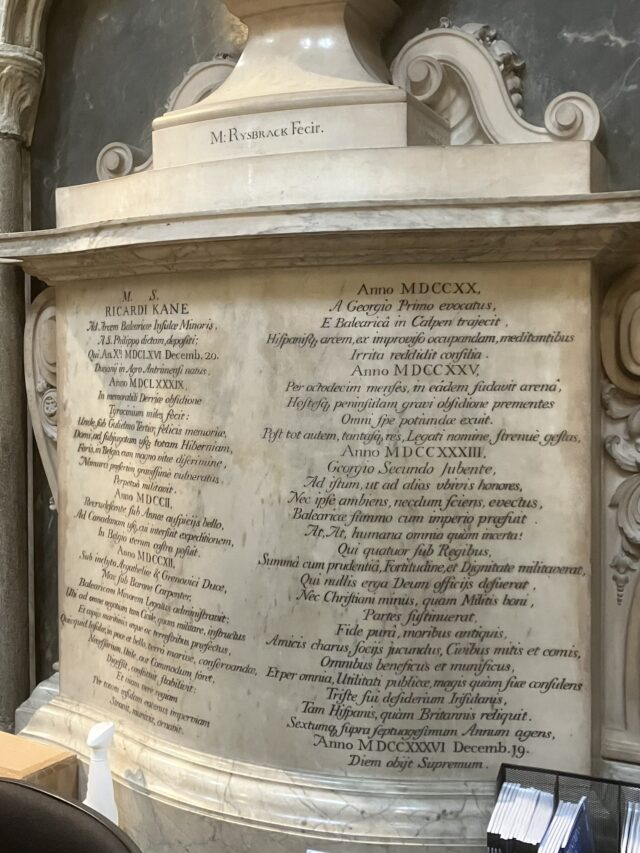Kane, Richard

In Latin: Sacred to the memory of Richard Kane laid to rest at the citadel of the Balearic island of Minorca named for Saint Philip, who was born on December 20th 1666 at Duneane in County Antrim. In 1689 he served his military apprenticeship in the famous siege of Derry, whereafter, under William III of blessed memory, he continued in armed service both at home, until the subjugation of all Ireland, and abroad, in Flanders, at great risk of life, not least by reason of a grave wound received at the siege of Namur. In the year 1702 when war broke out afresh in the reign of Queen Anne, again he campaigned in Belgium before joining the expedition to Canada. In the year 1712, under the renowned Duke of Argyll and Greenwich, and later under Baron Carpenter, he acted as civil governor of Minorca where, capably undertaking all tasks, both civil and military, and in command of army and navy alike, he planned, ordered and maintained everything that was necessary, expedient or beneficial for the preservation of the island, in war and in peace, on sea and on land, and also had paved, fortified and adorned a truly royal road throughout the length of an island hitherto impassable. In the year 1720 at the behest of George I he crossed from Mahon to Gibraltar and thwarted an attack by the Spaniards who planned to take it by surprise. In the year 1725 he returned to the same scene of action for eighteen months and, when the enemy laid the Peninsula under heavy siege, quashed their every hope of taking it. After this sequence of sterling achievements as Lieutenant Governor in the year 1733 at the command of George II, neither by his own seeking nor with prior knowledge, as with his other offices wheresoever held, he was elevated to the supreme command in Minorca. But oh, oh, how uncertain is the life of man! He who under four sovereigns had borne arms with the greatest prudence, courage and dignity, who had served God with all his heart and played the role not less of a Christian than of a good soldier, of pure faith and old-fashioned manners, dear to his friends, pleasant to his associates, mild and courteous to his fellow citizens, beneficent and munificent to all, and in all things concerned more for the public utility than for his own, left an island that was both British and Spanish sadly mourning his loss and in his seventy sixth year on December 19th 1736 breathed his last. [Translation courtesy of Westminster Abbey website, amended.]
Church: Westminster Abbey (in Westminster, London).
Sex:
Male.
Virtue(s):
Ability*, Achievement/success*, Benevolence*, Christianity/religion, Courage*, Courtesy, Dignity*, Faith*, Good friend, Good manners, Mildness*, Munificence, Pleasantness*, Prudence, Public service/spirit*, Purity, Service of God*, Soldierliness*.
Language:
Latin.
Year of death: 1736.
Age at death: 66 (classed as: Adult).
